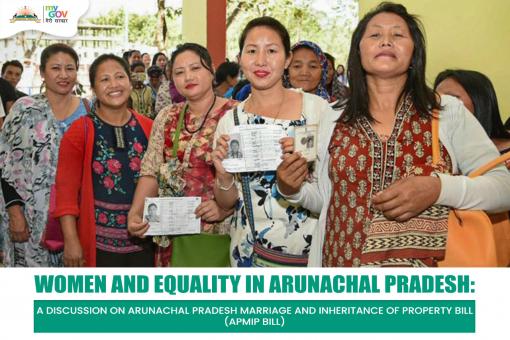A Discussion on Arunachal Pradesh Marriage and Inheritance of Property Bill (APMIP Bill)
Littles boys and girls in the indigenous households of Arunachal Pradesh are brought up with utmost care to turn into responsible citizens of the nation. However, when it comes to ancestral properties, sons have been favoured as entitled heirs as per age old traditions, for the continuation of family lineage. Despite having autonomy in domestic affairs, women did not have the right to inherit their parents’ or spouses’ properties customarily. The exception being that, if parents pass on their movable property to their daughters, they gain total rights and in some instances (such as an only girl child to a parent), women get to inherit the properties in the form of land and other assets.
In light of this, the Arunachal Pradesh State Women Commission (APSWC) drafted the Arunachal Pradesh Marriage and Inheritance of Property Bill (APMIP Bill), 2021 in collaboration with the Arunachal Pradesh State for Protection of Child Rights (APSPRCR) and the Arunachal Pradesh Women's Welfare Society (APWWS).
The bill intends to address the wider general issues about socio-economic situations and women's rights. The bill calls for regulating divorce, alimony payments, and marriage registration. Additionally, it has advocated for the criminalization of polygamy and the protection of widows and legally wed wives' property rights. In addition, the bill's Section 43 promotes granting Arunachal Pradesh Scheduled Tribe (APST) women who marry non-APST males the right to possess real estate. The bill states that: “An APST woman married to a non-APST man shall enjoy the legal right over any immovable properties acquired or inherited from her family in her lifetime. In the event of her death, the spouse and her heirs would have full rights over it for disposal and alienation to any indigenous APST tribal”.
If one views the state's centuries-old distinctive culture through a prismatic lens, men in Arunachal Pradesh society exercise ultimate authority in domestic matters. However, if viewed from a pragmatic angle, Arunachalee women contribute significantly to the economic, political, and sociocultural activities of their significant community, making it a much-needed women-centric tribal society.
Mygov-Arunachal calls for a discussion on the Arunachal Pradesh Marriage and Inheritance of Property Bill (APMIP Bill), 2021 and invites you to share your valuable insight and opinion on the equality of women in the state of Arunachal Pradesh and what steps we can further carry out to make our society equal and liberal in all aspects.

BrahmDevYadav 3 years 4 weeks ago
What are the steps to equality in State?
1.End violence against women and girls.
2.End child marriage.
3.Ensure all children complete 12 years of quality education.
4.Close the gender pay gap.
5.Divvy up unpaid labour equally.
6.Promote women's political leadership.
7.Ensure equal access to capital and banking.
BrahmDevYadav 3 years 4 weeks ago
What is the best way to ensure equality in State?
1.Identify & prevent unconscious bias. We all have unconscious biases.
2.Create equality, diversity & inclusion policies.
3.Mind your language.
4.Use objective criteria.
5.Be proactive.
4.Get advice if needed.
5.Watch out for indirect discrimination.
BrahmDevYadav 3 years 4 weeks ago
What are the five ways to promote equality?
1.Treating everyone equally and fairly.
2.Creating an inclusive culture that has respect for all cultures and religions.
3.Ensuring equal access to opportunities for all the citizens.
4.Enabling people to develop their full potential.
5.Educating people and making them understand the importance of Equality.
BrahmDevYadav 3 years 4 weeks ago
What are the problems faced by women's in India?
If we talk about today's scenario, many women are still facing the issues like gender discrimination, sexual abuse and harassment, education, child marriage.
BrahmDevYadav 3 years 4 weeks ago
What is the best thing about Arunachal Pradesh?
This northeastern Indian state Arunachal Pradesh is known for its pristine beauty and the lush green forests. The state is also known as the Land of the Rising Sun.
BrahmDevYadav 3 years 4 weeks ago
What is male female ratio in Arunachal Pradesh?
Sex Ratio in Arunachal Pradesh is 938 i.e. for each 1000 male, which is below national average of 940 as per latest census. In 2001, the sex ratio of female was 893 per 1000 males in Arunachal Pradesh.
BrahmDevYadav 3 years 4 weeks ago
Why is it important to improve gender equality?
Gender equality prevents violence against women and girls. It is essential for economic prosperity. Societies that value women and men as equal are safer and healthier. Gender equality is a human right.
BrahmDevYadav 3 years 4 weeks ago
How to reduce gender inequality in India?
1.Increasing representation of women by reserving seats in legislature, increasing the
reservation of seats to 50% in rural and urban self government.
2.The Equal Remuneration Act,1976 must be strictly enforced to reduce the existing wage gaps.
3.Strict punishment should be handed out to people promoting female foeticide.
BrahmDevYadav 3 years 4 weeks ago
What are the steps taken for gender equality?
In addition to the above-mentioned legislations and measures, the Indian government has undertaken numerous policy initiatives such as 'National Policy for Women Empowerment' and schemes such as 'Beti Bachao Beti Padhao', to secure a better, safe and equal place for women in society and to take care of their all round.
BrahmDevYadav 3 years 4 weeks ago
Why is it important to improve the status of women?
Improving the status of women and enhancing their role in society and development are not only important goals in themselves but also because of their positive influence on family life, family size and demographic transition.